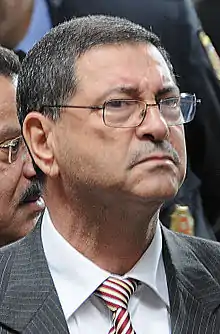Habib Essid
Habib Essid (Arabic: حبيب الصيد; born 1 June 1949) is a Tunisian politician who was Head of Government of Tunisia from 6 February 2015 to 27 August 2016. He was the first Head of Government to be appointed following the adoption of the new constitution and thus considered to be the first Head of Government of the Second Tunisian Republic. He previously served as Minister of the Interior in 2011.
Habib Essid حبيب الصيد | |
|---|---|
 | |
| 13th Prime Minister of Tunisia | |
| In office 6 February 2015 – 27 August 2016 | |
| President | Beji Caid Essebsi |
| Preceded by | Mehdi Jomaa |
| Succeeded by | Youssef Chahed |
| Minister of the Interior | |
| In office 28 March 2011 – 24 December 2011 | |
| Prime Minister | Beji Caid Essebsi |
| Preceded by | Farhat Rajhi |
| Succeeded by | Ali Laarayedh |
| Personal details | |
| Born | 1 June 1949 Sousse, Tunisia |
| Political party | Independent |
| Alma mater | Tunis University University of Minnesota, Twin Cities |
Early life, education and professional life
Born in Sousse in 1949, Essid received his master's degree in economics from Tunis University and added a masters programme in agricultural economics from the University of Minnesota.[1]
He started his career in the public sector, notably in the Ministry of Agriculture. In 1993, he was named cabinet director at the Ministry of Agriculture, remaining in that post until 1997. He later served as cabinet director at the Ministry of the Interior. In 2001, he was appointed as Secretary of State for Fishing and later on as Secretary of State for the Environment. From 2004 to 2010, Habib Essid was Executive Director of the International Olive Council, headquartered in Madrid.
After the Tunisian Revolution, he was appointed as Minister of the Interior in the government of Prime Minister Beji Caid Essebsi on 28 March 2011. He was also chosen by Hamadi Jebali to be his Security Advisor following the 23 October 2011 elections.
Head of Government of Tunisia
On 5 January 2015, Essid was nominated as Head of Government by Nidaa Tounes and asked to form a new government.[2]
Initially, he formed a government composed of two political parties: Nidaa Tounes and the Free Patriotic Union. Following the announcement, all excluded political parties rejected the formation, leaving Essid short of the required 109 seats needed to obtain confidence.
On 2 February 2015 the newly appointed Head of Government announced an inclusive new coalition government whose members include representatives of the Islamist Ennahda party and the secular parties Nidaa Tounes, the Free Patriotic Union and the liberals of Afek Tounes.[3] On 5 February 2015, Essid's cabinet was approved by the parliament.[4] The cabinet was sworn in the following day.[5]
On 26 June 2015, in the wake of the 2015 Sousse attacks, Essid promised to close 80 mosques within the week.[6][7] The tourism industry, prior to the March Bardo National Museum attack, accounted for seven percent of Tunisia's GDP and almost 400,000 direct and indirect jobs.[8] The government also plans to crack down on financing for certain associations as a countermeasure against another attack.[9] Essid announced that:
The country is under threat; the government is under threat. Without the cooperation of everyone and a show of unity, we cannot win this war. We have won some battles and lost others, but our objective is to win the war... Some mosques continue to spread their propaganda and their venom to promote terrorism. No mosque that does not conform to the law will be tolerated.[7]
Essid lost a parliamentary confidence vote on 30 July 2016; there were 118 votes against him and three in favor.[10]
References
- "Who's Who: Habib Essid". leaders.com.tn (in French).
- "Former interior minister nominated as new Tunisia premier". Reuters. 5 January 2015. Retrieved 5 January 2015.
- "Tunisian PM-designate proposes new coalition cabinet". Reuters. 2 February 2015. Retrieved 5 February 2015.
- "UPDATED: Tunisia MPs approve landmark new govt". AFP. 5 February 2015. Retrieved 5 February 2015.
- "Tunisia's secular-Islamist coalition takes office". AFP. 6 February 2015. Retrieved 5 March 2015.
- yahoo.com: "Tunisia government says to close 80 mosques for inciting violence, after hotel attack", 26 June 2015.
- Avaneesh Pandey, "Tunisia Hotel Attack: Prime Minister Vows To Close 80 Mosques Spreading 'Venom' In The Country", International Business Times, 27 June 2015.
- timesofisrael.com: "Tunisia to shut illegal mosques as IS claims deadly hotel attack", 27 June 2015.
- "Tunisia to close 80 mosques following terror attack", Deutsche Welle, 27 June 2015.
- Mohammed Argoubi, "Tunisia lawmakers vote to dismiss prime minister", Reuters, 30 July 2016.
External links
| Wikimedia Commons has media related to Habib Essid. |
| Political offices | ||
|---|---|---|
| Preceded by Mehdi Jomaa |
Prime Minister of Tunisia 2015–2016 |
Succeeded by Youssef Chahed |
